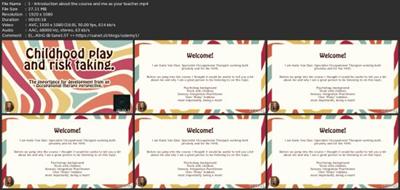- Thread Starter
- #1
Childhood Play And Risk Taking

What you'll learn
Different types of play
Stages of play
Conceptual assumptions of play
Playfulness and engagement
Executive functioning and play
A bit of Neuroscience and models
Risky play
Interventions with a sensory theme
Requirements
No previous experience needed
Description
Welcome to my course designed for occupational therapy professionals, educators, and parents seeking a deeper understanding of childhood development. Delve into the intricate world of play, from its diverse types to the crucial role it plays in neurological development and therapeutic intervention.In this course, we'll embark on a journey through the stages of childhood play, unraveling its complexities and uncovering the transformative power of risk-taking. From imaginative play to sensory exploration, you'll gain insights into the myriad forms of play that shape a child's cognitive, emotional, and social development.But we won't stop there. We'll also delve into the neuroscience behind play, exploring how it influences brain development and fosters essential skills such as problem-solving, creativity, and resilience. Understanding the science behind play will empower you to design more effective therapeutic interventions and educational strategies.One of the most critical aspects we'll explore is risky play-the often misunderstood but vital component of childhood development. You'll learn how embracing controlled risk can promote confidence, independence, and emotional regulation in children, all while ensuring their safety and well-being.Throughout the course, you'll discover evidence-based techniques and practical strategies drawn from the field of occupational therapy. Whether you're a seasoned therapist looking to deepen your expertise or a parent eager to support your child's development, this course offers valuable insights and actionable tools to enrich your practice and enhance the lives of the children you serve.- The Spectrum of Childhood Play: Types and Stages- The Neuroscience of Play: Insights into Brain Development- Understanding and Embracing Risky Play- Therapeutic Interventions and Strategies- Practical Applications for PracticeJoin me on this journey into childhood play and risk.
Overview
Section 1: Introduction
Lecture 1 Introduction: about the course and me as your teacher
Lecture 2 Learning objectives
Section 2: Different types of play
Lecture 3 Different types of play
Section 3: Stages of play
Lecture 4 Different stages of play
Section 4: Conceptual assumptions of play
Lecture 5 Conceptual assumptions of play
Section 5: Playfulness and engagement
Lecture 6 Playfulness and engagement
Section 6: Underlying executive functioning in play.
Lecture 7 Underlying executive functioning in play
Section 7: Neuroscience
Lecture 8 A bit of neuroscience
Section 8: Risky play.
Lecture 9 Risky play
Section 9: Complementary aspects of therapy intervention
Lecture 10 Intervention
Section 10: End of course quiz
Suitable for all learners from professionals to parents/carers

rapidgator.net:
nitroflare.com:

Published 3/2024
MP4 | Video: h264, 1920x1080 | Audio: AAC, 44.1 KHz
Language: English | Size: 542.19 MB | Duration: 1h 30m
Learn about different types and stages of play, theories, the neuroscience behind the scenes and intervention planning.
MP4 | Video: h264, 1920x1080 | Audio: AAC, 44.1 KHz
Language: English | Size: 542.19 MB | Duration: 1h 30m
Learn about different types and stages of play, theories, the neuroscience behind the scenes and intervention planning.
What you'll learn
Different types of play
Stages of play
Conceptual assumptions of play
Playfulness and engagement
Executive functioning and play
A bit of Neuroscience and models
Risky play
Interventions with a sensory theme
Requirements
No previous experience needed
Description
Welcome to my course designed for occupational therapy professionals, educators, and parents seeking a deeper understanding of childhood development. Delve into the intricate world of play, from its diverse types to the crucial role it plays in neurological development and therapeutic intervention.In this course, we'll embark on a journey through the stages of childhood play, unraveling its complexities and uncovering the transformative power of risk-taking. From imaginative play to sensory exploration, you'll gain insights into the myriad forms of play that shape a child's cognitive, emotional, and social development.But we won't stop there. We'll also delve into the neuroscience behind play, exploring how it influences brain development and fosters essential skills such as problem-solving, creativity, and resilience. Understanding the science behind play will empower you to design more effective therapeutic interventions and educational strategies.One of the most critical aspects we'll explore is risky play-the often misunderstood but vital component of childhood development. You'll learn how embracing controlled risk can promote confidence, independence, and emotional regulation in children, all while ensuring their safety and well-being.Throughout the course, you'll discover evidence-based techniques and practical strategies drawn from the field of occupational therapy. Whether you're a seasoned therapist looking to deepen your expertise or a parent eager to support your child's development, this course offers valuable insights and actionable tools to enrich your practice and enhance the lives of the children you serve.- The Spectrum of Childhood Play: Types and Stages- The Neuroscience of Play: Insights into Brain Development- Understanding and Embracing Risky Play- Therapeutic Interventions and Strategies- Practical Applications for PracticeJoin me on this journey into childhood play and risk.
Overview
Section 1: Introduction
Lecture 1 Introduction: about the course and me as your teacher
Lecture 2 Learning objectives
Section 2: Different types of play
Lecture 3 Different types of play
Section 3: Stages of play
Lecture 4 Different stages of play
Section 4: Conceptual assumptions of play
Lecture 5 Conceptual assumptions of play
Section 5: Playfulness and engagement
Lecture 6 Playfulness and engagement
Section 6: Underlying executive functioning in play.
Lecture 7 Underlying executive functioning in play
Section 7: Neuroscience
Lecture 8 A bit of neuroscience
Section 8: Risky play.
Lecture 9 Risky play
Section 9: Complementary aspects of therapy intervention
Lecture 10 Intervention
Section 10: End of course quiz
Suitable for all learners from professionals to parents/carers
Screenshots

rapidgator.net:
You must reply in thread to view hidden text.
nitroflare.com:
You must reply in thread to view hidden text.
